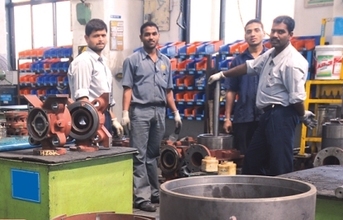
Many manufacturing jobs do not expose the worker to modern techniques, machinery and definitely no training facilities, the latter which is very vital for the country's unskilled labour, which is also not addressed by the country's education system.
At a time, where multi-tasking is the norm world over, workers in our manufacturing sector lack even basic skills for primary level of work which is a major concern. To add to this, the image portrayed by the manufacturing industry is that of dirty, dark and dangerous environment coupled with low pay and no job-security. The latter being a result of numerous lay-offs in the recent years which in reality were to reduce the number of unskilled workers. Another humungous task is getting older employees to enrol onto a training programme and help them to develop skills. The Indian labour law also does not support in firing underperforming workers.
One should also not forget the changing economic environment of consumerism - aspirations of the current generation of work force, white or blue collar, are similar, they all want to use the latest gadgets despite the hard economic situation and rising prices.
Archaic labour laws
Leading Economists have long identified India's archaic labour laws as the biggest bane to the manufacturing sector. Some of the 51 Central and 170 state labour statutes are dated pre-independence. These stringent laws have allowed labour disputes and unrest, besides hindering growth in the labour intensive industries forcing them to remain small and not helping companies to restructure to increase productivity and output. Many big manufacturing organisations are using ‘contract' workers to bypass these rigid laws, in fact 70 percent of the workers are on contractual basis, out of which majority are still in the unorganised, informal sector. Except for a few states - Maharashtra, Gujarat, Tamil Nadu and Karnataka, showing accelerating growth and employment in this sector, the rest of India is contributing to the decline in the share of the manufacturing sector.
The Government is already aware of the problem. It has brought in measures for skill development of the workforce. The National Skill Development Policy covers life-long learning, and effective convergence between school education, various skill development efforts of Government as well as the initiatives between Government and private sector, besides other measures.
This has led to setting up of a National-level council and promotion of the National Skill Development Corporation (NSDC) - a public-private partnership initiative to provide the funding and course guidance. The ambitious target is to scale up the rate of skill development and to inculcate skills to 500 million people by 2020.


























